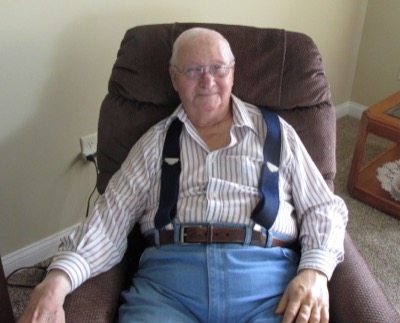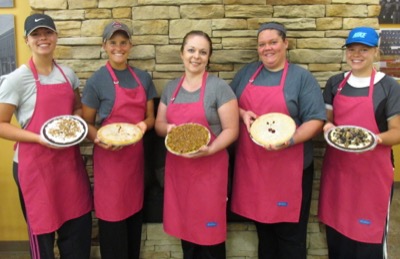Friday, July 3rd, 2015
Local vet recalls horrors of epic Korean War battle
By Kathy Thompson

Photo by Kathy Thompson/The Daily Standard
Norbert Huffman, a U.S. Army veteran of the Korean War, says he's "just a lucky guy" after surviving multiple wounds during the horrendous fight for Pork Chop Hill. His left arm was shattered so badly that it had to be amputated.
CELINA - Norbert Huffman lost an arm, both kneecaps and lives with a bullet in his left leg from the intense battle on Pork Chop Hill against Chinese forces in North Korea in 1953.
The 84-year-old Celina resident doesn't like to talk about how he was one of only a few who made it off the hill alive or that he received a Purple Heart and other medals for his service.
He told the newspaper he's just a "lucky guy."
"I did my duty and what I was told," Huffman said of his time in the U.S Army and the tour in North Korea. "It was a scary time. We were all young guys. I'd never seen anything like that in my life."
He was 21 and a sergeant with six men under his command when he served in Korea. The battle for the hill took months as U.S. forces and the Chinese exchanged control.
The mission was to slide through the trenches in different directions and find a spot on the hill to watch for the enemy.
"We had our communication system and a gun," Huffman said. "We had to stay in one spot from dusk to dawn. Creeping up to the hill in the dark and then back down again before the sun came up. The enemy was looking for us, too. We were basically in no-man's land."
Huffman remembers one night on the hill when he spotted an enemy soldier about 50 yards away.
"He was just walking across the hill," he said quietly, recalling that night. "I couldn't move. I knew that if he spotted me he'd bring the entire enemy army down on us."
Huffman also remembered the weather being bitterly cold.
"It was about 20 below zero at times. So cold that we were changing our socks every three hours and putting the wet ones against our chests to dry them out and warm them up," he said. "We only got to take a shower every three months. That's when we would get back to the base and get three days of rest and a hot meal."
Prior to him getting wounded, Huffman tried to check on his unit because the company was receiving heavy motor fire.
"They were throwing big shells down on us," he said. "I'd sent my guys out and wanted to check on them. But the shells started coming down fast and hard and I had to crawl into a tile tube."
Huffman said he stayed curled in the tube listening to the shrapnel pinging off it and the roadway.
"I really don't know how I squeezed into it," Huffman grinned. "I tried to get in the next day, but couldn't. I guess you can do things when you really need to."
On the morning before he was shot, he tried to advance up the hill.
"We had been hearing our guys were getting overrun," Huffman said. "They were having to retreat and we were ordered to take their places. So many guys were getting wounded or killed. I know there was a time I ended up in a trench with a dead North Korean. I didn't even know it for a while."
Hand grenades were thrown at Huffman as he led his men up the hill. His left hand was blown away, shrapnel hit him in the chest and head, and bullets found his arms and legs.
"We were pretty much surrounded," he said. "We were waiting on tanks to take out the wounded. That's how I got taken out. They laid me on top of a tank without a turret and took me to a place where they could quickly help me. There was only room for four or five guys on a tank, so they had to keep coming back. So many, so many."
His eyes misted with tears and he took deep breaths to compose himself before he continued.
"I just remember when they took me to the evac hospital there were guys all around me without arms and legs," Huffman said. "Blood was everywhere. It was a horrible sight. One I'll never forget."
Huffman was taken by helicopter to the nearest hospital and then to Japan, where he said he was treated by "top-notch nurses and doctors." Three months later he was taken by a hospital ship to Hawaii - a ride that seemed like an endless journey, he added.
"Every time the doctors had to operate or do something, they would have to stop or slow the ship down," Huffman said. "It just took what seemed like a really long time."
His 13-month journey to recovery wasn't over yet. He was taken next to California, then Michigan and finally to Walter Reed Hospital in Washington D.C., where he spent another four months.
"Once I was there, they decided I was out of the Army," Huffman remembered. "So I drove a car back to Rockford that my uncle had given me and started my life over."
Huffman in 1965 met his wife, Shirley, at a Christmas Eve party in Rockford. A few years later they were married and raised her two children, Chuck Samples of Tennessee and Debbie Torge of Celina.
Chuck Samples said his stepfather taught them respect and discipline.
"He's not one to ever, and I mean ever, talk about the things he's done," Samples said. "He's never wanted a pat on the back. But he's one of the best men I know and I think people should know about the guys like him who served their country."
Huffman continues to survive against all odds.
"I had a massive heart attack in 1975, which made me retire, had various heart diseases and just had an aorta value operation about three weeks ago," he said. "I'm still here."


